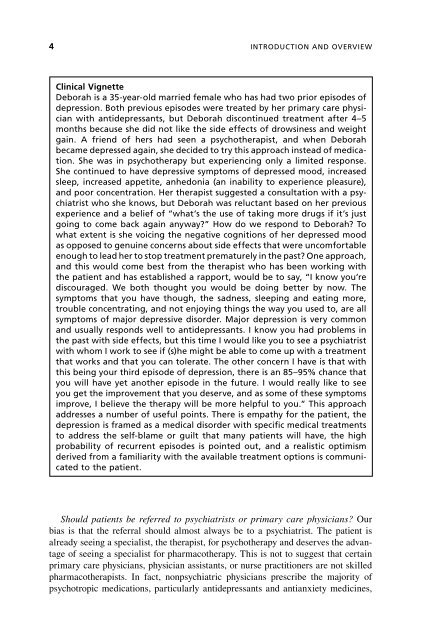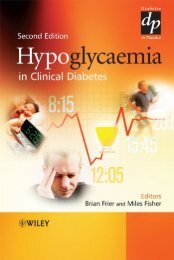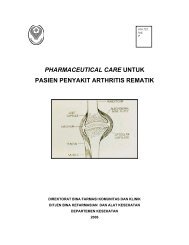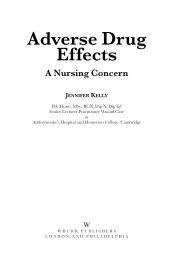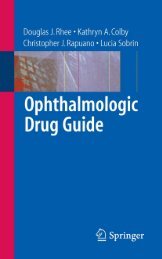- Page 2 and 3: PRINCIPLES OFPSYCHOPHARMACOLOGYFOR
- Page 4 and 5: Copyright © 2006 by John Wiley & S
- Page 6 and 7: CONTENTSPrefaceFaculty Disclosurexv
- Page 8: CONTENTSix5 ANXIETY DISORDERS 1275.
- Page 13 and 14: xivCONTENTS13.2 Norepinephrine-Rela
- Page 15 and 16: FACULTY DISCLOSUREJeffrey E. Kelsey
- Page 17 and 18: FACULTY DISCLOSURExixBoard of Direc
- Page 19: 2 INTRODUCTION AND OVERVIEWThe goal
- Page 23 and 24: 6 INTRODUCTION AND OVERVIEWClinical
- Page 25 and 26: 2BASICS OFPSYCHOPHARMACOLOGY2.1 INT
- Page 27 and 28: NORMAL HUMAN NERVOUS SYSTEM 11ture
- Page 29 and 30: NORMAL HUMAN NERVOUS SYSTEM 13a kne
- Page 31 and 32: NORMAL HUMAN NERVOUS SYSTEM 15This
- Page 33 and 34: NORMAL HUMAN NERVOUS SYSTEM 17to du
- Page 35 and 36: PATHOPHYSIOLOGY: STUDY OF WHAT GOES
- Page 37 and 38: PATHOPHYSIOLOGY: STUDY OF WHAT GOES
- Page 39 and 40: PHARMACOLOGY 23Only when we look at
- Page 41 and 42: PHARMACOLOGY 25However, if an indiv
- Page 43 and 44: PHARMACOLOGY 27soon see that for al
- Page 45 and 46: PHARMACOLOGY 29mitter. When a molec
- Page 47 and 48: PHARMACOLOGY 31the bacteria more ef
- Page 49 and 50: PUTTING IT ALL TOGETHER 33Diagnose
- Page 51 and 52: ADDITIONAL READING 35Owens MJ, Mulc
- Page 53 and 54: 38 MOOD DISORDERSMajor Depression (
- Page 55 and 56: 40 MOOD DISORDERSMajor depression v
- Page 57 and 58: 42 MOOD DISORDERSthe initial episod
- Page 59 and 60: 44 MOOD DISORDERSTABLE 3.4. Medical
- Page 61 and 62: 46 MOOD DISORDERSthese characterist
- Page 63 and 64: 48 MOOD DISORDERSTABLE 3.7. Functio
- Page 65 and 66: 50 MOOD DISORDERSlar, stimulants we
- Page 67 and 68: 52 MOOD DISORDERSTABLE 3.8. Tricycl
- Page 69 and 70: 54 MOOD DISORDERSIn the 1980s, deca
- Page 71 and 72:
56 MOOD DISORDERSSertraline (Zoloft
- Page 73 and 74:
58 MOOD DISORDERSand norepinephrine
- Page 75 and 76:
60 MOOD DISORDERSThe cytochrome P 4
- Page 77 and 78:
62 MOOD DISORDERSThere are several
- Page 79 and 80:
TABLE 3.11. Choosing an Antidepress
- Page 81 and 82:
66 MOOD DISORDERSContinuation Phase
- Page 83 and 84:
68 MOOD DISORDERSfor those with an
- Page 85 and 86:
70 MOOD DISORDERStermed “endogeno
- Page 87 and 88:
72 MOOD DISORDERSTABLE 3.13. Diagno
- Page 89 and 90:
74 MOOD DISORDERSWhereas patients w
- Page 91 and 92:
76 MOOD DISORDERSmania prior to the
- Page 93 and 94:
78 MOOD DISORDERSreason, brain imag
- Page 95 and 96:
80 MOOD DISORDERSLithium toxicity c
- Page 97 and 98:
82 MOOD DISORDERSantidepressants (T
- Page 99 and 100:
84 MOOD DISORDERSor the reticulocyt
- Page 101 and 102:
86 MOOD DISORDERScannot predict in
- Page 103 and 104:
88 MOOD DISORDERSand to provide pro
- Page 105 and 106:
90 MOOD DISORDERSagents. Carbamazep
- Page 107 and 108:
92 MOOD DISORDERSof other medicatio
- Page 109 and 110:
94 MOOD DISORDERSADDITIONAL READING
- Page 111 and 112:
4SCHIZOPHRENIA4.1 BRIEF DESCRIPTION
- Page 113 and 114:
BRIEF DESCRIPTION AND DIAGNOSTIC CR
- Page 115 and 116:
PRESENTATION AND CLINICAL COURSE 10
- Page 117 and 118:
INITIAL EVALUATION AND DIFFERENTIAL
- Page 119 and 120:
INITIAL EVALUATION AND DIFFERENTIAL
- Page 121 and 122:
HISTORY OF TREATMENT 107fact that t
- Page 123 and 124:
HISTORY OF TREATMENT 109drugs. Even
- Page 125 and 126:
HISTORY OF TREATMENT 111As a group,
- Page 127 and 128:
HISTORY OF TREATMENT 113Chlorpromaz
- Page 129 and 130:
HISTORY OF TREATMENT 115physicians.
- Page 131 and 132:
HISTORY OF TREATMENT 117most effect
- Page 133 and 134:
HISTORY OF TREATMENT 119Olanzapine
- Page 135 and 136:
CURRENT APPROACH TO TREATMENT 121Th
- Page 137 and 138:
CURRENT APPROACH TO TREATMENT 123If
- Page 139 and 140:
ADDITIONAL READING 125tion combinat
- Page 141 and 142:
128 ANXIETY DISORDERSwith a single
- Page 143 and 144:
130 ANXIETY DISORDERSdisasters, or
- Page 145 and 146:
132 ANXIETY DISORDERSresult of thei
- Page 147 and 148:
134 ANXIETY DISORDERSTricyclic Anti
- Page 149 and 150:
136 ANXIETY DISORDERSdizziness, and
- Page 151 and 152:
138 ANXIETY DISORDERSintensely noxi
- Page 153 and 154:
140 ANXIETY DISORDERSIn particular,
- Page 155 and 156:
142 ANXIETY DISORDERSLike the MAOIs
- Page 157 and 158:
144 ANXIETY DISORDERSagoraphobic av
- Page 159 and 160:
146 ANXIETY DISORDERSrange from 4%
- Page 161 and 162:
148 ANXIETY DISORDERSAnxiety Disord
- Page 163 and 164:
150 ANXIETY DISORDERSA controlled t
- Page 165 and 166:
152 ANXIETY DISORDERSthree times ea
- Page 167 and 168:
154 ANXIETY DISORDERSunclear whethe
- Page 169 and 170:
156 ANXIETY DISORDERSTourette’s D
- Page 171 and 172:
158 ANXIETY DISORDERSStarted at 15-
- Page 173 and 174:
160 ANXIETY DISORDERSTABLE 5.9. Dia
- Page 175 and 176:
162 ANXIETY DISORDERSothers, as the
- Page 177 and 178:
164 ANXIETY DISORDERSlimitation is
- Page 179 and 180:
166 ANXIETY DISORDERSfor the effect
- Page 181 and 182:
168 ANXIETY DISORDERSTABLE 5.10. Di
- Page 183 and 184:
170 ANXIETY DISORDERSwarrants lifel
- Page 185 and 186:
172 ANXIETY DISORDERSTricyclic Anti
- Page 187 and 188:
174 ANXIETY DISORDERSof PTSD, it ca
- Page 189 and 190:
176 ANXIETY DISORDERSNemeroff CB. A
- Page 191 and 192:
178 SUBSTANCE USE DISORDERSregularl
- Page 193 and 194:
180 SUBSTANCE USE DISORDERSIn contr
- Page 195 and 196:
182 SUBSTANCE USE DISORDERSOne impo
- Page 197 and 198:
184 SUBSTANCE USE DISORDERSSocial f
- Page 199 and 200:
186 SUBSTANCE USE DISORDERSdevelop
- Page 201 and 202:
188 SUBSTANCE USE DISORDERScation i
- Page 203 and 204:
190 SUBSTANCE USE DISORDERSAversion
- Page 205 and 206:
192 SUBSTANCE USE DISORDERSStage Th
- Page 207 and 208:
194 SUBSTANCE USE DISORDERSexcessiv
- Page 209 and 210:
196 SUBSTANCE USE DISORDERSAcampros
- Page 211 and 212:
198 SUBSTANCE USE DISORDERSsame ben
- Page 213 and 214:
200 SUBSTANCE USE DISORDERS6.10 NIC
- Page 215 and 216:
202 SUBSTANCE USE DISORDERSTABLE 6.
- Page 217 and 218:
204 SUBSTANCE USE DISORDERSLAAM (Le
- Page 219 and 220:
206 SUBSTANCE USE DISORDERSADDITION
- Page 221 and 222:
208 EATING DISORDERSdisorder is war
- Page 223 and 224:
210 EATING DISORDERSTABLE 7.2. Diag
- Page 225 and 226:
212 EATING DISORDERSTABLE 7.3. Some
- Page 227 and 228:
214 EATING DISORDERSThe use of appe
- Page 229 and 230:
216 EATING DISORDERS7.2.6 Current A
- Page 231 and 232:
218 EATING DISORDERSpsychiatric nos
- Page 233 and 234:
220 EATING DISORDERSTABLE 7.7. Phys
- Page 235 and 236:
222 EATING DISORDERSFinally, althou
- Page 237 and 238:
224 EATING DISORDERSduring purging
- Page 239 and 240:
226 EATING DISORDERSsignificantly i
- Page 241 and 242:
228 EATING DISORDERSdoses. The typi
- Page 243 and 244:
230 EATING DISORDERSRoerig JL, Mitc
- Page 245 and 246:
232 ATTENTION DEFICIT-HYPERACTIVITY
- Page 247 and 248:
234 ATTENTION DEFICIT-HYPERACTIVITY
- Page 249 and 250:
236 ATTENTION DEFICIT-HYPERACTIVITY
- Page 251 and 252:
238 ATTENTION DEFICIT-HYPERACTIVITY
- Page 253 and 254:
240 ATTENTION DEFICIT-HYPERACTIVITY
- Page 255 and 256:
242 ATTENTION DEFICIT-HYPERACTIVITY
- Page 257 and 258:
244 ATTENTION DEFICIT-HYPERACTIVITY
- Page 259 and 260:
246 ATTENTION DEFICIT-HYPERACTIVITY
- Page 261 and 262:
248 ATTENTION DEFICIT-HYPERACTIVITY
- Page 263 and 264:
250 ATTENTION DEFICIT-HYPERACTIVITY
- Page 265 and 266:
252 ATTENTION DEFICIT-HYPERACTIVITY
- Page 267 and 268:
254 ATTENTION DEFICIT-HYPERACTIVITY
- Page 269 and 270:
9SLEEP DISORDERS9.1 INTRODUCTIONPsy
- Page 271 and 272:
INTRODUCTION 259eye movement (REM)
- Page 273 and 274:
INSOMNIA 261falling asleep (initial
- Page 275 and 276:
INSOMNIA 263to professional attenti
- Page 277 and 278:
INSOMNIA 265worsen obstructive slee
- Page 279 and 280:
INSOMNIA 267TABLE 9.3. Medical Illn
- Page 281 and 282:
INSOMNIA 269(besides their many use
- Page 283 and 284:
INSOMNIA 271antipsychotics are safe
- Page 285 and 286:
INSOMNIA 273Magnesium. Recent resea
- Page 287 and 288:
NARCOLEPSY 275• Use the bed only
- Page 289 and 290:
NARCOLEPSY 277of complete remission
- Page 291 and 292:
NARCOLEPSY 279Pemoline (Cylert). Pe
- Page 293 and 294:
ADDITIONAL READING 281regimen. The
- Page 295 and 296:
10ALZHEIMER’S DISEASE ANDOTHER DE
- Page 297 and 298:
PREVALENCE AND RISK FACTORS 285•
- Page 299 and 300:
PREVALENCE AND RISK FACTORS 287solv
- Page 301 and 302:
INITIAL EVALUATION AND DIFFERENTIAL
- Page 303 and 304:
INITIAL EVALUATION AND DIFFERENTIAL
- Page 305 and 306:
HISTORY OF PHARMACOLOGICAL TREATMEN
- Page 307 and 308:
HISTORY OF PHARMACOLOGICAL TREATMEN
- Page 309 and 310:
HISTORY OF PHARMACOLOGICAL TREATMEN
- Page 311 and 312:
HISTORY OF PHARMACOLOGICAL TREATMEN
- Page 313 and 314:
HISTORY OF PHARMACOLOGICAL TREATMEN
- Page 315 and 316:
CURRENT APPROACH TO TREATMENT 303st
- Page 317 and 318:
CURRENT APPROACH TO TREATMENT 305us
- Page 319 and 320:
CURRENT APPROACH TO TREATMENT 307TA
- Page 321 and 322:
CURRENT APPROACH TO TREATMENT 309ch
- Page 323 and 324:
ADDITIONAL READING 311Bullock R. Tr
- Page 325 and 326:
314 PERSONALITY DISORDERSHow then h
- Page 327 and 328:
316 PERSONALITY DISORDERSnostic cri
- Page 329 and 330:
318 PERSONALITY DISORDERSis a repea
- Page 331 and 332:
320 PERSONALITY DISORDERScollateral
- Page 333 and 334:
322 PERSONALITY DISORDERSThe limite
- Page 335 and 336:
324 PERSONALITY DISORDERSthat child
- Page 337 and 338:
326 PERSONALITY DISORDERS11.3.4 His
- Page 339 and 340:
328 PERSONALITY DISORDERSin BPD. Th
- Page 341 and 342:
330 PERSONALITY DISORDERSaddress ea
- Page 343 and 344:
332 PERSONALITY DISORDERSDPD patien
- Page 345 and 346:
334 PERSONALITY DISORDERSand dopami
- Page 347 and 348:
336 PERSONALITY DISORDERSTrestman R
- Page 349 and 350:
338 TRAUMATIC BRAIN INJURYlong-term
- Page 351 and 352:
340 TRAUMATIC BRAIN INJURY12.1.4 In
- Page 353 and 354:
342 TRAUMATIC BRAIN INJURYescitalop
- Page 355 and 356:
344 TRAUMATIC BRAIN INJURYConsequen
- Page 357 and 358:
346 TRAUMATIC BRAIN INJURYwho exper
- Page 359 and 360:
348 TRAUMATIC BRAIN INJURYgeneral,
- Page 361 and 362:
350 TRAUMATIC BRAIN INJURYin TBI pa
- Page 363 and 364:
352 TRAUMATIC BRAIN INJURYa control
- Page 365 and 366:
354 MANAGING SIDE EFFECTSmany of th
- Page 367 and 368:
356 MANAGING SIDE EFFECTSTABLE 13.1
- Page 369 and 370:
358 MANAGING SIDE EFFECTSalthough t
- Page 371 and 372:
360 MANAGING SIDE EFFECTSeffects of
- Page 373 and 374:
362 MANAGING SIDE EFFECTS13.2.2 Sid
- Page 375 and 376:
364 MANAGING SIDE EFFECTStreat Park
- Page 377 and 378:
366 MANAGING SIDE EFFECTSAntidepres
- Page 379 and 380:
368 MANAGING SIDE EFFECTSpatient a
- Page 381 and 382:
370 MANAGING SIDE EFFECTSdose. Once
- Page 383 and 384:
372 MANAGING SIDE EFFECTSPsychiatri
- Page 385 and 386:
374 MANAGING SIDE EFFECTSSexual Sid
- Page 387 and 388:
376 MANAGING SIDE EFFECTSdo produce
- Page 389 and 390:
378 MANAGING SIDE EFFECTSTABLE 13.7
- Page 391 and 392:
380 MANAGING SIDE EFFECTStricyclic
- Page 393 and 394:
INDEXAbecarnil, see β-carbolineAbi
- Page 395 and 396:
INDEX 385Disulfiram, 195, 198Donepe
- Page 397 and 398:
INDEX 387Obesity, 227Obsessive-comp
- Page 399:
INDEX 389Valerian root, 272Valium,


